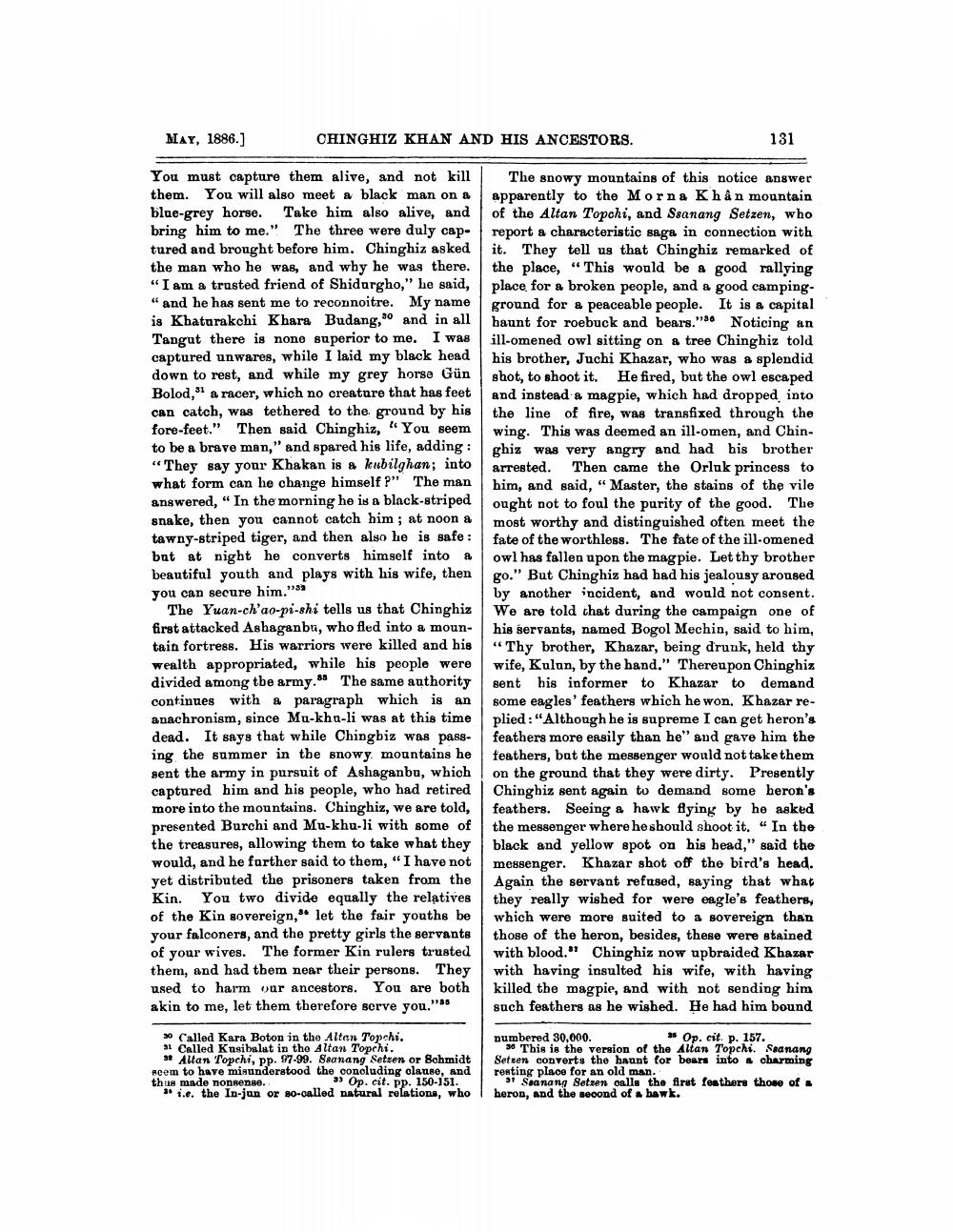________________
MAY, 1886.]
CHINGHIZ KHAN AND HIS ANCESTORS.
131
You must capture them alive, and not kill them. You will also meet a black man on & blue-grey horse. Take him also alive, and bring him to me." The three were duly cap- tured and brought before him. Chinghiz asked the man who he was, and why he was there. "I am a trusted friend of Shidurgho," he said, " and he has sent me to reconnoitre. My name is Khatarakchi Khara Budang, and in all Tangut there is none superior to me. I was captured unwares, while I laid my black head down to rest, and while my grey horse Gün Bolod," a racer, which no creature that has feet can catch, was tethered to the ground by his fore-feet." Then said Chinghiz, "You seem to be a brave man," and spared his life, adding: “They say your Khakan is a kubilghan; into what form can he change himself ?" The man answered, " In the morning he is a black-striped snake, then you cannot catch him ; at noon a tawny-striped tiger, and then also he is safe : but at night he converts himself into a beautiful youth and plays with his wife, then you can secure him."
The Yuan-ch'ao-pi-shi tells us that Chinghiz first attacked Ashaganbu, who fled into a mountain fortress. His warriors were killed and his wealth appropriated, while his people were divided among tbe army." The same authority continues with a paragraph which is an anachronism, since Mu-khu-li was at this time dead. It says that while Chingbiz was passing the summer in the snowy mountains he sent the army in pursuit of Ashaganbu, which captured him and his people, who had retired more into the mountains. Chinghiz, we are told, presented Burchi and Mu-khu-li with some of the treasures, allowing them to take what they
llowing them to take what they would, and he farther said to them, "I have not yet distributed the prisoners taken from the Kin. You two divide equally the relatives of the Kin sovereign," let the fair youths be your falooners, and the pretty girls the servants of your wives. The former Kin rulers trusted them, and had them near their persons. They used to harm our ancestors. You are both akin to me, let them therefore serve you."
The snowy mountains of this notice answer apparently to the Morna Khân mountain of the Altan Topchi, and Ssanang Setzen, who report a characteristic saga in connection with it. They tell us that Chinghiz remarked of the place, “This would be a good rallying place for a broken people, and a good campingground for a peaceable people. It is a capital haunt for roebuck and bears." Noticing an ill-omened owl sitting on a tree Chinghiz told his brother, Juchi Khazar, who was a splendid shot, to shoot it. He fired, but the owl escaped and instead a magpie, which had dropped into the line of fire, was transfixed through the wing. This was deemed an ill-omen, and Chinghiz was very angry and had his brother arrested. Then came the Orluk princess to him, and said, “Master, the stains of the vile ought not to foul the purity of the good. The most worthy and distinguished often meet the fate of the worthless. The fate of the ill-omened owl has fallen upon the magpie. Let thy brother go." But Chinghiz had had his jealousy aroused by another incident, and would not consent. We are told that during the campaign one of his servants, named Bogol Mechin, said to him, “Thy brother, Khazar, being drunk, held thy wife, Kulan, by the hand." Thereupon Chinghiz sent his informer to Khazar to demand some eagles' feathers which he won. Khazar replied: "Although he is supreme I can get heron's feathers more easily than he" and gave him the feathers, bat the messenger would not take them on the ground that they were dirty. Presently Chingbiz sent again to demand some heron's feathers. Seeing & hawk flying by he asked the messenger where he should shoot it." In the black and yellow spot on his head," said the messenger. Khazar shot off the bird's head. Again the servant refused, saying that what they really wished for were eagle's feathers, which were more suited to a sovereign than those of the heron, besides, these were stained with blood." Chinghiz now upbraided Khazar with having insulted his wife, with having killed the magpie, and with not sending him such feathers as he wished. He had him bound
so Called Kara Boton in the Altan Topchi. 31 Called Kusibalat in the Altan Topchi.
» Altan Topchi, pp. 97-99. Sranang Setzen or Schmidt noem to have misunderstood the concluding clause, and thus made nonsense.
Op. cit. pp. 150-151. * ie. the In-jun or so-called natural relations, who
numbered 30,000.
* Op. cit. p. 157. 3. This is the version of the Allan Topchi. Seanang Setsen converts the haunt for bears into charming resting place for an old man.
" Sanang Setren oalls the first feathers those of heron, and the second of a hawk.




